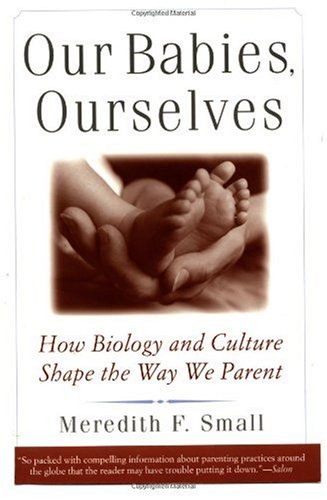Sleeping Arangements Across Climates
Anthropologist John Whiting found a simple association between climate and parent-child co-sleeping (among other behaviors).^ Evaluating 136 societies for which he had information. Whiting outlined four kinds of typical sleeping arrangements for a household: mother and father in the same bed with baby in another bed; mother and baby together and father somewhere else; all members of the family in separate beds; and all members of the family together in one bed. The most prominent pattern across cultures, Whiting discovered, was mother with child and father in another place (50 percent of the 136 cultures). In another 16 percent, the baby slept with both mother and father. Many of these cultures, he wrote, were polygynous, so that fathers were moving among households and beds, and the stable unit was actually each mother with her children. Whiting also found a connection to cold weather. Men and women, that is, couples, routinely sleep together in places where the winter temperature falls below 50 degrees—presumably for warmth more than any other reason—but they often have separate sleeping arrangements where the climate is warmer. The sleeping place of babies, on the other hand, usually conforms to a different climatic situation—they "usually" stay with mother in areas with warm climates, but in colder climates, they are swaddled in blankets and strapped to cradleboards to minimize heat loss. These cultures, however, represent a small minority of the human population.
Notes:
Climate seems to predict where the child sleeps in relation to the parents.
Folksonomies: parenting infancy cosleeping
Taxonomies:
/family and parenting/children (0.635623)
/law, govt and politics/legal issues/human rights (0.435845)
/science/weather (0.352809)
Keywords:
Anthropologist John Whiting (0.915567 (neutral:0.000000)), typical sleeping arrangements (0.844948 (neutral:0.000000)), mother (0.680885 (positive:0.291461)), different climatic situation—they (0.664767 (neutral:0.000000)), Climates Climate (0.606365 (negative:-0.701403)), colder climates (0.512896 (negative:-0.395266)), warm climates (0.489026 (positive:0.276256)), separate beds (0.472565 (neutral:0.000000)), simple association (0.455541 (neutral:0.000000)), prominent pattern (0.439878 (neutral:0.000000)), stable unit (0.423850 (positive:0.306666)), cultures (0.421382 (negative:-0.224831)), cold weather (0.420507 (negative:-0.435778)), small minority (0.414822 (neutral:0.000000)), winter temperature (0.408639 (neutral:0.000000)), human population (0.406628 (neutral:0.000000)), heat loss (0.398856 (negative:-0.748632)), father (0.344245 (neutral:0.000000)), baby (0.272044 (neutral:0.000000)), percent (0.271425 (negative:-0.243028)), child (0.229295 (negative:-0.701403)), place (0.215553 (neutral:0.000000)), members (0.208825 (neutral:0.000000)), family (0.208695 (neutral:0.000000))
Entities:
John Whiting:Person (0.846943 (negative:-0.435778)), 16 percent:Quantity (0.846943 (neutral:0.000000)), 50 degrees:Quantity (0.846943 (neutral:0.000000)), 50 percent:Quantity (0.846943 (neutral:0.000000))
Concepts:
Sleep (0.945038): dbpedia | freebase | opencyc
Family (0.732881): dbpedia | freebase
Bed (0.669778): dbpedia | freebase | opencyc
Co-sleeping (0.594889): dbpedia | freebase
Weather (0.576304): dbpedia | freebase
Climate (0.557481): dbpedia | freebase
Circadian rhythm (0.548747): dbpedia | freebase
Climate change (0.508328): dbpedia | freebase





